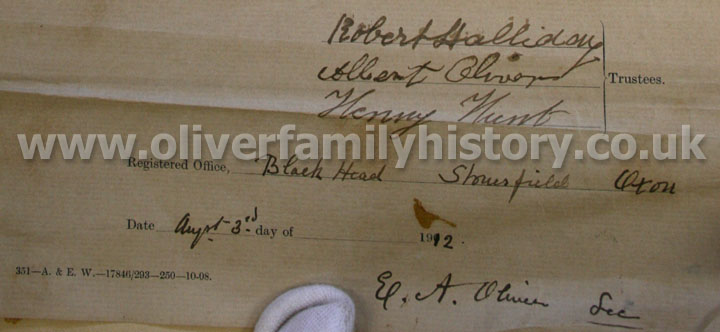The Stonesfield Friendly Society
Long before the introduction of the modern Welfare State the towns and villages of England were largely responsible for establishing their own means of financial support in times of sickness, old age and bereavement.
It was common for towns and villages to form Friendly or Benefit Societies with the aim of gathering, by subscription, a fund for the mutual relief of its members as and when required. Payment for sickness was strict however, for example, payments would not be made if illness was caused by fighting, football, small pox inoculations or venereal disease.
Stonesfield was no exception and founded the Stonesfield Friendly Society on November 5th 1765.
Throughout its existence the Stonesfield Friendly Society headquarters included the Black Boy Public House, the Rose and Crown Public House and the Black Head Public House.
Each year on the 29th March the Society would hold a great feast, the villagers would form a procession through the village and make their way to the church where they would hear a sermon preached by the Minister. A cricket match against a rival village would be held after which a huge dinner with music would be enjoyed by all.

Many Olivers were longstanding members of the society, however, in the late 1800’s and early 1900’s the society was managed by six officers; two trustees, two treasurers, a secretary and a doctor, and two of these were Olivers.
Albert Oliver (b. 1841, Stonemason) was a trustee for a long period and Albert’s son, Ernest Albert Oliver (b. 1866, Builder) was the Secretary. In 1898 Albert was actually made the ‘Father of the Society’, presumably for his long and dedicated commitment and service to the society.
With the introduction of the 1911 National Insurance Act, the 1912 Society General Meeting included the completion and signing of a form to request cancellation of registry. The image below captures the signatures of Albert and Ernest on that very form.
In the late 1800’s there were over 27’000 registered Friendly Societies, today there are only around 200, however we all owe something of our family history to these societies.

Oliver Family History
Stories
1600 - 1699
- Oliver Hearth Tax record
- First Oliver marriage in Oxfordshire
1700 - 1799
- Oliver found in 1762 Rectors book
- Stonesfield & Finstock Oliver's
1800 - 1899
- Methodism comes to Stonesfield
- Oliver's discover dinosaurs?
- An Oliver Waterloo veteran
- James Oliver Army Discharge Papers
- Solomon and Joshua - Banished!
- Lost to a tragic maritime disaster
- The Welsh connection
- Oliver prisoner portrait
- Oliver's found playing cricket
- Fantastic Oliver family photograph
- Workhouse lives
- Stonesfield turns on the waterworks
1900 - Current Day
- Built by Olivers in Oak Bay,Canada
- A 100 year old cricket medal
- The Stonesfield Friendly Society
- A WW1 hero remembered
- Oliver men on Oxford War Memorials
- Oliver Army records
- Success at the Village Fete
- Sole Survivor of H49 during WWII
- Aussie Cycling Champion
- Record Breaking Blanket Making
- Oliver Weddings through the years